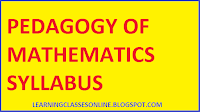PEDAGOGY OF MATHEMATICS B.ED SYLLABUS AND COURSE CONTENT
After completion of the course, student
teachers will be able to:
1.
explain the meaning,
nature, aims, and objectives of mathematics
2.
perform
pedagogical analysis of various concepts in
mathematics
3.
describe
instructional planning and development of relevant material for the teaching of
mathematics
4.
use ICT in
teaching of mathematics
5.
describe a continuous and comprehensive evaluation, diagnostic testing and remedial
teaching in mathematics
6.
explain
importance and uses of learning resources in
mathematics
7.
improve
competences in a secondary level mathematics
COURSE CONTENT (Syllabus)
UNIT I
Concept and Aims of Teaching of Mathematics
·
Meaning,
scope and nature of mathematics
·
Aims and
objectives of teaching mathematics at the secondary stage
·
Framing
objectives according to Blooms taxonomy
·
Nature
of mathematical propositions, use of quantifiers and Venn diagram
·
A
Mathematical theorem and its variants- converse, inverse, and contrapositive,
proofs and types of proof.
Historical Perspective of Mathematics
·
History of
mathematics with special emphases on the teaching of mathematics
·
Coexistence
of precision and beauty in mathematics
UNIT-2
Development of Curriculum in Mathematics
·
Meaning and
objectives of curriculum
·
Principles
for designing the curriculum of mathematics at different stages of schooling
·
Recent
curriculum reform at the national/ state level at their critical appraisal
·
Content
Analysis, Pedagogical Analysis, and their comparison
·
Pedagogical
analysis of the following topics of mathematics
o
Equations
o
Sets
o
Volume
o
Trigonometry
o
Ratio and proportion
Methods of Teaching Mathematics
·
Inductive - deductive
·
Analytic – synthetic
· Problem Solving
·
Heuristic method
UNIT-3
Learning Resources
·
Importance
of summer programs, correspondence courses, mathematics club, contests and
fairs
·
Designing
mathematics laboratory and its effective use
·
Importance
of recreational activities – games, puzzles, and riddles in mathematics
·
Projective
and non- projective teaching aids
Instructional and Material Development
·
Writing of
lesson plan
·
Micro lesson
planning with special reference to following micro-teaching skills of Introduction, the probing question, classroom management, the skill of illustration with examples,
skill of reinforcement
·
Preparation
and use of audiovisual material and equipment
·
Application
of ICT in teaching of mathematics
UNIT-4
Evaluation in Mathematics
·
Evaluation
Tools: Meaning, need and use of diagnostic testing and remedial teaching
·
Continuous
and comprehensive evaluation
·
Formative
and summative evaluation
·
Criterion
and norm reference test
Professional Development of Mathematics
Teachers
·
Types of In-service
program for mathematics teacher
·
Role of
mathematics teachers association, journals and other resource material in
mathematics education
·
Professional
growth through participation in conference/ seminars/workshop
Tasks
& Assignments: Any one of the following
·
Preparation
of a unit plan in Mathematics
·
Preparation
of lesson plans on two different approaches on a selected content matter
·
Development
of learning aids on any topic in Mathematics and procedure for using it.
·
Book review
of any two books in Mathematics.
·
Any other
task/assignment given by the institution.
SUGGESTED READINGS AND BOOKS FOR PEDAGOGY OF MATHEMATICS:
·
Alen, D.W
and Ryan, K.A. (1969). Microteaching, reading. Masschusetts, Falifornia:
Addition Wesley.
·
Bloom, B.Se.
(1956). Taxonomy of Educational Objectives. Handbook No.
1, New York: Longmans Green.
·
Boyer, C. B.
(1968). History of Mathematics. New York: John
Wiley.
·
Butler, C.H.
and Wren, K.H. (1980). The teaching of secondary mathematics. New
York: McGraw-Hill Book Company.
·
Bush, R.N.
(1968). Microteaching- Control practice in the training to teachers in
communication, Opp. 201-207.
·
Dave,
R.H. and
Saxena, R.C. (1970).
Curriculum & Teaching
of Maths in
Secondary Schools. A Research Monograph, Delhi: NCERT
·
Davis, D.R.
(1951). The teaching of Mathematics. London: Addison Wesclyh Press.
·
Kulshrestha,
A.K. (2007). The teaching of Mathematics. Meerut: R.Lal Book Depot.
·
Mangal, S.K.
(2007). The teaching of Mathematics, New Delhi: Arya Book Depot.
·
Shankaran
and Gupta, H.N. (1984). Content- cum – Methodology of teaching Mathematics. New
Delhi: NCERT.
Similar Posts
- PEDAGOGY /TEACHING OF HINDI SYLLABUS
- PEDAGOGY OF ENGLISH B.ED SYLLABUS
- Jean Piaget Theory of Cognitive Development
- Stages of Growth and Development: From Infancy to Adolescence
- Reading for Global and Local Comprehension: Enhancing Understanding at All Levels
- The Acquisition of Reading Skills: Strategies and Techniques for Effective Learning
- The Concept of Growth and Development: Understanding Their Meaning and Significance
- (10) Principles of Growth and Development: Understanding Child Development
- What Is Hearing Impairment ?: Meaning, Definition, Causes, Types and Characteristics
- Continuous And Comprehensive Evaluation (CCE) Notes
- Pedagogy of English Lesson Plan Format for B.Ed and Teachers
- Art Lesson Plan in Hindi | कला शिक्षा पाठ योजना
- B.Ed Syllabus
- WORK EDUCATION SYLLABUS
- UNDERSTANDING THE SELF SYLLABUS
- UNDERSTANDING DISCIPLINES AND SUBJECTS SYLLABUS
- SKILL IN TEACHING SYLLABUS
- SCHOOL BASED ACTIVITIES SYLLABUS
- Reading and reflecting on texts syllabus
- PEDAGOGY OF SANSKRIT SYLLABUS
💁Hello Friends, If You Want To Contribute To Help Other Students To Find All The Stuff At A Single Place, So Feel Free To Send Us Your Notes, Assignments, Study Material, Files, Lesson Plan, Paper, PDF Or PPT Etc. - 👉 Upload Here
अगर आप हमारे पाठकों और अन्य छात्रों की मदद करना चाहते हैं। तो बेझिझक अपने नोट्स, असाइनमेंट, अध्ययन सामग्री, फाइलें, पाठ योजना, पेपर, पीडीएफ या पीपीटी आदि हमें भेज सकते है| -👉Share Now
If You Like This Article, Then Please Share It With Your Friends Also.
Bcoz Sharing Is Caring😃
For the Latest Updates and More Stuff... Join Our Telegram Channel...



Post a Comment
Please Share your views and suggestions in the comment box